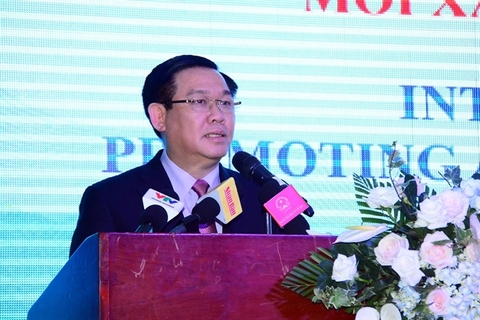
Deputy Prime Minister Vuong Dinh Hue speaks at the Global OCOP Network Connection Forum held on Wednesday in HCM City. — VNS Photo Bo Xuan Hiep
Deputy Prime Minister Vuong Dinh Hue has asked agencies to enhance linkages between cities and provinces nationwide and other countries to form a global network for the One Commune, One Product (OCOP) programme.
Hue said the OCOP programme would help restructure the rural economy, reduce migration of rural labourers to cities, and protect the environment, as well as maintain social stability in rural areas.
Speaking at the Global OCOP Network Connection Forum held on Wednesday in HCM City, Hue noted that the programme improves the quality of Vietnamese agricultural products and services, and enhances trademarks and the value of local products both nationally and globally.
“Thanks to the programme, many quality products with great designs made in rural areas are distributed in prestigious local and foreign stores, supermarkets and supermarket chains,” he said.
“The programme has improved the new rural area development model, especially the livelihood criterion that is part of the model,” he noted.
Tran Thanh Nam, Deputy Minister of Agricultural and Rural Development (MARD), said that 42 of 63 provinces and major cities have approved implementation of OCOP projects.
The programme’s objectives in the 2018-20 period include improving agricultural and non-agricultural products and services in each locality, creating a value chain with the involvement of the private and public sectors.
Developing agricultural tourism is also one of the important measures, he said.
Viet Nam has 6,010 registered agricultural enterprises, co-operatives and production households, with 4,823 “strong” (those with a competitive advantage) agricultural products, he added.
Groups of goods and services defined in the programme include food (fresh and processed farm produce); beverages (alcoholic and non-alcoholic drinking); medicinal herbs (products made from herbal plants); fabric and textiles (products made from cotton and yarn); souvenirs, furniture, and decorations (products made from wood, fiber, rattan, metal and ceramics); and rural tourism services and sales (services for sightseeing, tourism, study and research).
The programme is implemented at an estimated cost of VND45 trillion (US$1.94 billion).
Capital comes from many sources such as SMEs, cooperatives, and production households, as well as loans from credit institutions, investment funds, SMEs development funds, and funding from international organisations.
To date, 43 countries have approved the OCOP programme, 20 of which have joined the network.
The one-day forum was chaired by MARD in co-ordination with Viet Nam Handicraft Export Association (Vietcraft), “One Village, One Product” (OVOP) International Co-operation Committee (Japan), and the OCOP Global Network Connection.
The forum aims to strengthen co-operation between the countries in implementing OVOP or OCOP programmes, as well as promoting the OVOP or OCOP movement in the world and Viet Nam.
Int’l fair 2019
As part of the forum, the International OCOP Fair 2019 opened on Wednesday in the city’s Sai Gon Exhibition and Convention Centre.
The fair, which runs through April 20, features more than 700 booths of businesses from more than 40 provinces and cities across the country.
The fair also attracted participation of businesses from 15 countries and territories, including Japan, the Netherlands, India, Laos, Cambodia, Thailand, China, Kenya, Senegal, Afghanistan, Madagascar, Botswana, Australia, Nepal and Russia.
This year’s fair is expected to attract more than 1,600 international visitors from 47 countries and territories, including those from the US, Europe, Japan, Australia, among others.
Speaking at the opening ceremony, Nguyen Minh Tien, chief of the Central New Rural Coordination Office, said the fair aims to promote made-in-Viet Nam handicraft and new designs from Vietnamese handicraft villages to local and international buyers.
It will also promote trade connections between Vietnamese localities and foreign partners, he said.
The handicraft industry is one of the most important sectors contributing to the country’s total exports, according to Tien.
Last year, the industry’s export turnover reached more than US$2 billion, generating income and employment for nearly 1.5 million workers in rural areas, he said.
The event is organised by the MARD in collaboration with the Vietcraft, and Japan’s “One Village One Product” programme.
Last year, the country exported agricultural products worth $43 billion and they are expected to reach $45 billion this year. — VNS